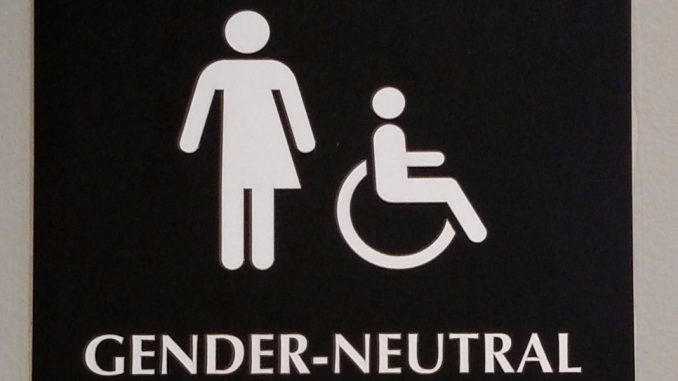
The Supreme Court unceremoniously denied review Tuesday in a case that would have clarified once and for all whether separating bathrooms based on biological sex violates either Title IX of the Education Amendments of 1972 or the equal protection clause of the Constitution.
Now, the nation must wait with bated breath for publication of the Department of Education’s final Title IX rule. That Biden administration rule promises to upend decades of sex equality in education by allowing students in a federally funded school to use the bathroom that corresponds to their gender identity, rather than their biological sex.
In the case Martinsville School District v. A.C., a biological girl who “identified” as a boy sought access to the boys’ restrooms at her middle school. Per the policy of Indiana’s Martinsville school district, the girl’s requests were denied; however, she was permitted access to a single-use, gender-neutral bathroom.
Unsatisfied, the student filed a lawsuit, claiming that the school district’s bathroom policy was discriminatory and a violation of civil rights and constitutional law. Both the federal trial court and the U.S. Court of Appeals for the 7th Circuit enjoined the school district’s policy and permitted the student’s bathroom access according to her gender identity.
In increasing measure, however, challenges to educational institutions such as those in the Martinsville case have resulted in widely varied outcomes across the country.
The en banc 11th Circuit Court of Appeals, for example, has held that neither Title IX nor the 14th Amendment’s equal protection clause deprives schools of the ability to maintain bathrooms separated by biological sex. But both the 4th and 7th Circuits have held the opposite, concluding that both Title IX and the equal protection clause prohibit schools from denying students access to bathrooms corresponding to their gender identity.
Many court watchers credit one particular Supreme Court decision as the pebble that triggered an avalanche of legal battles over the meaning of “sex” in federal law: the 2020 decision in Bostock v. Clayton County, Georgia.
In an opinion by Justice Neil Gorsuch, the court in Bostock interpreted the word “sex” in Title VII of the Civil Rights Act of 1964, which prohibits employment discrimination, to include “gender identity.”
In excoriating the majority of justices in Bostock for “legislating,” instead of “interpreting,” Justice Samuel Alito in a dissenting opinion predicted future challenges like those in the Martinsville case, writing:
What the Court has done today—interpreting discrimination because of ‘sex’ to encompass discrimination because of sexual orientation or gender identity—is virtually certain to have far-reaching consequences.
Over 100 federal statutes prohibit discrimination because of sex. … The briefs in these cases have called to our attention the potential effects that the Court’s reasoning may have under some of these laws, but the Court waves those considerations aside.
As to Title VII itself, the Court dismisses questions about ‘bathrooms, locker rooms, or anything else of the kind.’ … And it declines to say anything about other statutes whose terms mirror Title VII’s.
The Court’s brusque refusal to consider the consequences of its reasoning is irresponsible. … Before issuing today’s radical decision, the Court should have given some thought to where its decision would lead.
As the briefing in these cases has warned, the position that the Court now adopts will threaten freedom of religion, freedom of speech, and personal privacy and safety.
Martinsville School District v. A.C. seemed to be an ideal vehicle to remedy the Bostock dilemma. In fact, the 7th Circuit Court of Appeals, in issuing its decision on behalf of the transgender student, wrote: “Litigation over transgender rights is occurring all over the country, and we assume that at some point the Supreme Court will step in with more guidance than it has furnished so far.”
Alas, the public—and federal courts—must wait a little longer for that guidance.
The Supreme Court appears generally allergic to transgender-related issues, having regularly turned down similar disputes.
The high court declined to take up a student’s challenge to a Virginia school bathroom policy in Grimm v. Gloucester County School Board in 2021. Last year, the court declined to intervene to enforce West Virginia’s ban on transgender athletes. And in June, it declined to disturb a ruling favoring a transgender-identifying man who claimed he was deprived by the government of his hormone treatment while in jail.
But there may still be time for clarification during this Supreme Court term on the parameters of transgender “rights” under state and federal law. Still pending in petitions for review before the high court are four more cases implicating gender identity.
One is a challenge to a state court’s removal of a self-identified transgender child from the care of fit Christian parents because of their refusal to accept the minor child’s gender identity. The other two cases ask the court to determine whether parents have a constitutional right to secure experimental “gender- affirming care” (genital surgery, cross-sex hormones, and puberty blockers) for their minor children in the states of Tennessee and Kentucky.
In the final case, a group of parents is asking the court to determine whether a public school’s policy is unconstitutional in hiding information about the expressed gender identity of minor school children from their parents.
Around the time that the Supreme Court’s term winds down in June, the Biden administration will release its much anticipated Title IX rule—expanding long-standing protections for girls and young women in K-12 schools and college institutions to any boy or young man who identifies as a woman.
At that point, the Supreme Court may have no choice but to finally weigh in. The sooner the better.
Have an opinion about this article? To sound off, please email letters@DailySignal.com, and we’ll consider publishing your edited remarks in our regular “We Hear You” feature. Remember to include the URL or headline of the article plus your name and town and/or state.
